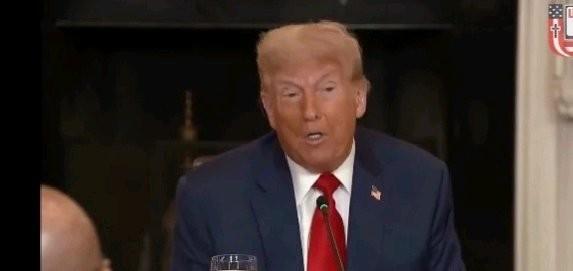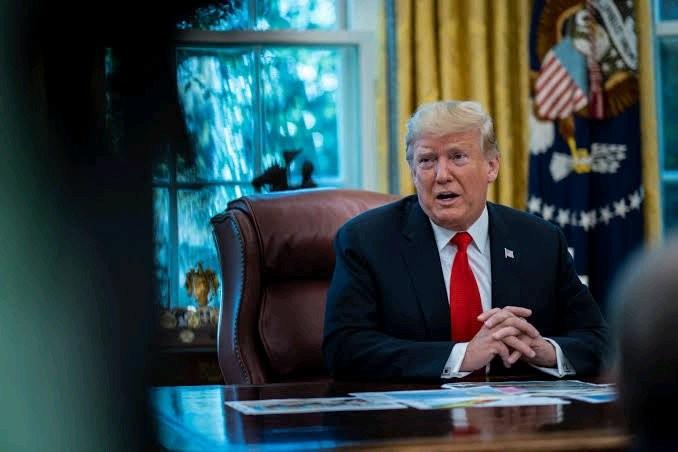Senegal, Gabon, Liberia… Trump hosts five African leaders at White House.
United States President Donald Trump has met with his counterparts from Senegal, Liberia, Guinea-Bissau, Mauritania, and Gabon.
The African leaders had lunch with Trump at the White House on Wednesday and discussed expanding commercial opportunities between the US and their respective nations.
The meeting marked the beginning of a three-day mini-summit, featuring a series of largely closed-door engagements on trade and economic cooperation, expected to run through Friday.
While details of what has been termed the “African leaders” summit are not clear, observers say the narrow selection of participants raises questions about inclusivity and representation.
Analysts argue that inviting only five leaders out of Africa’s 54 countries sends the wrong message—particularly given the absence of regional powerhouses like Nigeria, South Africa, Egypt, and Kenya, which play key roles in shaping the continent’s political and economic direction.
Nigeria, South Africa, and Egypt are aligned with BRICS, an economic bloc that Trump has repeatedly criticised.
Earlier this week, the US president threatened that countries aligning themselves with the “anti-American policies of BRICS” would be charged an additional 10 percent tariff.
All five African countries hosted at the White House currently face a 10 percent tariff.
Discussions could revolve around trade in critical minerals and possibly hosting deportees.
United States President Donald Trump has met with his counterparts from Senegal, Liberia, Guinea-Bissau, Mauritania, and Gabon.
The African leaders had lunch with Trump at the White House on Wednesday and discussed expanding commercial opportunities between the US and their respective nations.
The meeting marked the beginning of a three-day mini-summit, featuring a series of largely closed-door engagements on trade and economic cooperation, expected to run through Friday.
While details of what has been termed the “African leaders” summit are not clear, observers say the narrow selection of participants raises questions about inclusivity and representation.
Analysts argue that inviting only five leaders out of Africa’s 54 countries sends the wrong message—particularly given the absence of regional powerhouses like Nigeria, South Africa, Egypt, and Kenya, which play key roles in shaping the continent’s political and economic direction.
Nigeria, South Africa, and Egypt are aligned with BRICS, an economic bloc that Trump has repeatedly criticised.
Earlier this week, the US president threatened that countries aligning themselves with the “anti-American policies of BRICS” would be charged an additional 10 percent tariff.
All five African countries hosted at the White House currently face a 10 percent tariff.
Discussions could revolve around trade in critical minerals and possibly hosting deportees.
Senegal, Gabon, Liberia… Trump hosts five African leaders at White House.
United States President Donald Trump has met with his counterparts from Senegal, Liberia, Guinea-Bissau, Mauritania, and Gabon.
The African leaders had lunch with Trump at the White House on Wednesday and discussed expanding commercial opportunities between the US and their respective nations.
The meeting marked the beginning of a three-day mini-summit, featuring a series of largely closed-door engagements on trade and economic cooperation, expected to run through Friday.
While details of what has been termed the “African leaders” summit are not clear, observers say the narrow selection of participants raises questions about inclusivity and representation.
Analysts argue that inviting only five leaders out of Africa’s 54 countries sends the wrong message—particularly given the absence of regional powerhouses like Nigeria, South Africa, Egypt, and Kenya, which play key roles in shaping the continent’s political and economic direction.
Nigeria, South Africa, and Egypt are aligned with BRICS, an economic bloc that Trump has repeatedly criticised.
Earlier this week, the US president threatened that countries aligning themselves with the “anti-American policies of BRICS” would be charged an additional 10 percent tariff.
All five African countries hosted at the White House currently face a 10 percent tariff.
Discussions could revolve around trade in critical minerals and possibly hosting deportees.
0 Commenti
·0 condivisioni
·505 Views







